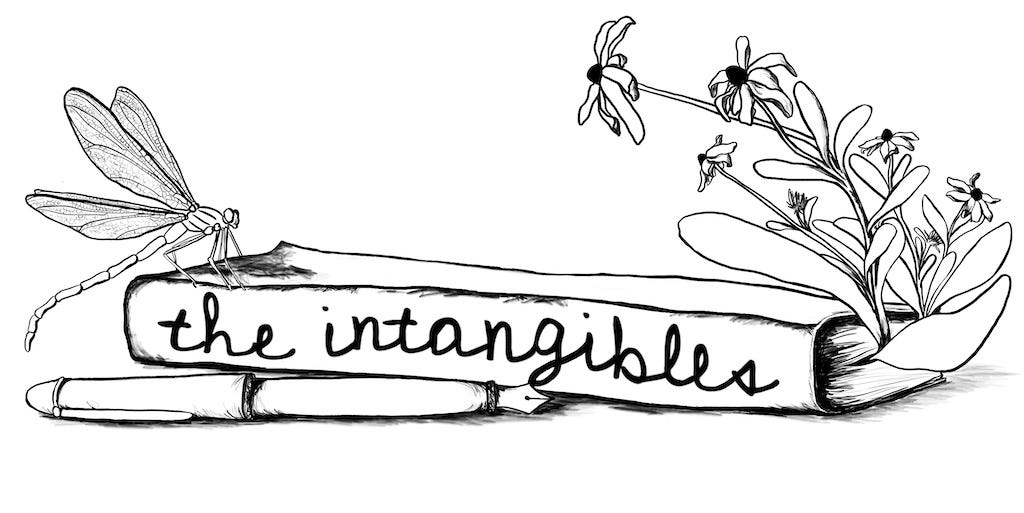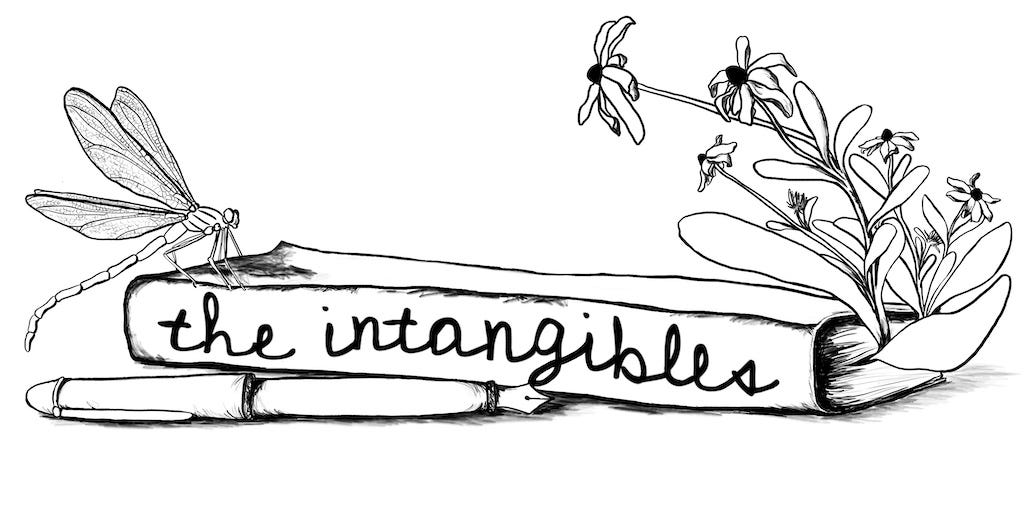Hi, readers of the intangibles! I’m essayist Allison Kirkland, and this publication was created to celebrate and explore the world of creative nonfiction and the writing life. I’m so glad you’re here.
I didn’t want to write about Generative AI. Maybe if I don’t acknowledge it, I thought, it’ll just go away. I heard about Large Language Models (LLM) such as ChatGPT first from various friends and family in tech, and then, quickly – in the past month – their presence has become inescapable. It reminds me of the ivy that grows in my yard: I blink and it’s everywhere, and I’m trying to pull it up by the roots and throw it in the yard waste bin before it takes hold.
It’s on LinkedIn: When I go to create a post on LinkedIn, a little button in the lower lefthand corner of the text box reads “rewrite with AI.”
Hm, no thanks, I’ll use my own words. After all, I’ve spent a lifetime of hard, joyful work learning how to use words properly, in a way I’m proud of, and in a way that represents me.
It’s on Google: When I type a search term into Google, it creates an AI summary at the top of the webpage that I didn’t ask for. When I look at it I can feel my brain switch off — and not in a relaxing way. Gone are the days of exploring the many tabs that used to arrive on the screen, allowing me to discover something new that I didn’t even expect to find. AI has done all of that fun exploratory work for me. It has combed every corner of the internet and come up with the collated answer to any question I could think of. I guess my exploring days are over.
(You can eliminate this unnecessary AI summary from the top of your Google search results by typing in -ai after each search term. So, for example, if you’re searching “lemurs” you can type in “lemurs - ai” in the search bar.)
It’s in the classroom: this past month I began hearing from my colleagues, professors who regularly teach undergraduate writing composition classes at colleges and universities across the United States. They all reported the same thing: students are turning in papers written by ChatGPT.
It’s in my drafts: when my Microsoft Word was renewed this year, I noticed that the price was hiked from $69 to $99. Curious as to why, I did some research and found that AI is now being embedded into Microsoft Word and is training itself with each word you write.
(You can turn this feature off by going to Preferences, then clicking on Privacy and disabling something called Connected Experiences. However, if you turn this feature off, there are several adjoining features that are rendered unusable.)
AI is here on this platform: when I first joined Substack I had to toggle a specific setting to keep AI from training itself on the very words you’re reading — words that took me hours of my one wild and precious life to choose, arrange and type into this post. And if you keep AI from training itself on the writing you create on Substack, it may, in their words “limit your discoverability.” So, fewer people are reading my words because I don’t want them to be used to train a robot.

And then, just when I thought that Generative AI couldn’t get any more ubiquitous, I saw a commercial on YouTube that suggested using AI to write a bedtime story for your children. I shivered.
I’ve been trying to write this post for the entire month of June, to put in writing what I think about the use of Generative AI as it grows in tendrils all across my world. The words wouldn’t come. I couldn’t quite finish the post. I kept stalling out. Finally it dawned on me that maybe I don’t want to write about Generative AI because I don’t want to debate one more way in which I wish the world was different than it is.
I am too tired to debate, to try and change minds. I want to grieve.
My parents read to me every night as a child. Fresh from a bath, I sat on warm laps as they turned the pages. Goodnight Moon. Where the Wild Things Are. Pat the Bunny. The Very Hungry Caterpillar. Green Eggs and Ham. The Berenstain Bears. Madeline.
I loved the pictures and the words. I loved to go through each step of the plot, to wonder at how the stories were going to end, and then find out the ending when we turned the last page. But, even more, I loved knowing that these books were made by other people, just like me. We shared the same world and we were navigating it together. Something — our human-ness — connected us to each other. “This is the type of world we live in,” those books seemed to whisper to me. “A world where people just like you create these beautiful things.” Sitting in those warm laps, I wondered what else might be possible.
I remember the first silly poem I wrote when I was about seven years old. As I chose each word carefully, I discovered new sounds, new combinations of words. I sat present with the world as I tried to put it down on paper. I discovered that choosing just the right word to convey exactly what I’m trying to say is like solving a wonderful, complex puzzle. It brings me joy and stimulation, even if it sometimes frustrates me. It humbles me. It forces me to confront an empty page. It wasn’t easy, but when I was done I had made something from absolutely nothing, and it was something nobody else could make.
“Generative AI is not going anywhere,” people say. “It’s a tool. It’s inevitable. You might as well learn how to use it.” I’ve heard these sentences repeated by my high school’s Instagram account, and by people in my circle who call themselves writers and artists.
I grieve the profound lack of imagination that springs from those sentences. I grieve that anyone would think that anything is inevitable. Anything at all.
Let me grieve. Let me tend to this emptiness.
You are reading the intangibles, by writer and creative writing instructor Allison Kirkland. This publication is geared toward writers of memoir and creative nonfiction and the people who love them.
If a paid subscription doesn't make sense for you right now, there are other ways to support the growth of this reader-supported publication:
click that little heart to "like" the post
gift a subscription to a creative friend
share this essay with another writer
leave a comment and help grow this creative community
take a screenshot of your favorite snippet and tag me on Instagram @alliekirkland
Thanks for reading. I’m so glad you’re here.









Your coda is what I've been circling around -- how easy it is for people to say "it can't change", what a failure of imagination that is. Thanks for writing this, for making space for grief, and for continuing to imagine the possibilities.
I agree with you completely, Allison!
In fact, I'm thinking of embracing any typos readers find in my stories with the line, "Yes, I did that on purpose so you would know it wasn't written by AI, it was written by a human being!"